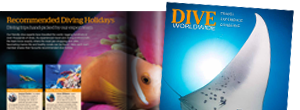Dive on colourful reefs teeming with life and experience one of the most mesmerising scenes of the underwater world. Home to a quarter of all marine species, tropical coral reefs enchant and delight divers and snorkellers alike. Our reef diving trips and destinations take you to some of the most beautiful coral reefs in the world.



Why our reef diving holidays are so successful




About coral reef diving
Bursting with colour and life, coral reefs have the capacity to delight and mesmerise in equal measure. Resembling vibrant underwater cities, there are many locations with fabulous reefs and for many, they are the highlight of any dive or snorkelling experience.
The most diverse coral reefs on planet earth are found in the Asia Pacific region in an area known as the Coral Triangle. In addition to their beauty, coral reefs and a precious resource and need continued efforts to protect them from the pressures of the modern world.
Understanding coral reefs

A coral reef is not a single entity, but is made of up billions of tiny animals, called polyps that work together to build a coral reef. These polyps are related to both jellyfish and anemones, but differ in that they leave behind a mineral skeleton - the foundations of a coral reef. They feed on plankton, while shallow corals also gain energy through photosynthesis from the sun.
In addition to being of vital importance to both humans and marine life, divers and snorkellers revel in their kaleidoscope of vibrant colours and myriad marine life.
The Coral Triangle

Raja Ampat in eastern Indonesia is currently thought to have the greatest diversity of corals of all, putting it at the centre of the coral triangle and at the top of many divers wishlists, offering some of the most exceptional diving opportunities in the world. Due to their location, the Philippines, Malaysia, Papua New Guinea, Fiji and the Solomon Islands also offer outstanding diving opportunities.
Great reef diving locations

Travel to Belize’s barrier reef or outer atolls for colourful Caribbean reefs that are great for divers and snorkellers alike, or take a trip to Tobago to enjoy some of the region’s healthiest coral gardens. Bonaire also offers classic Caribbean reef diving, with many sites accessible as shore dives.
Like an artist's palette, the reefs of the Philippines, Indonesia and the South Pacific dazzle, with Fiji’s wonderful reefs deservedly earning it the title of ‘soft coral capital of the world’. This region is known as the coral triangle.
Protecting coral reefs

The creation of marine protected areas has been shown to greatly benefit local reefs and also fish populations. Many such schemes have been introduced on a local level with very positive results.
Keeping pollution to a minimum is also vital, ensuring clean water for the coral reefs. This allows them to gain more energy through photosynthesis from the sun, ensuring they remain healthy. Healthy corals have been shown to be more resistant and are better able to survive periods of higher ocean temperatures that can result in coral bleaching.









